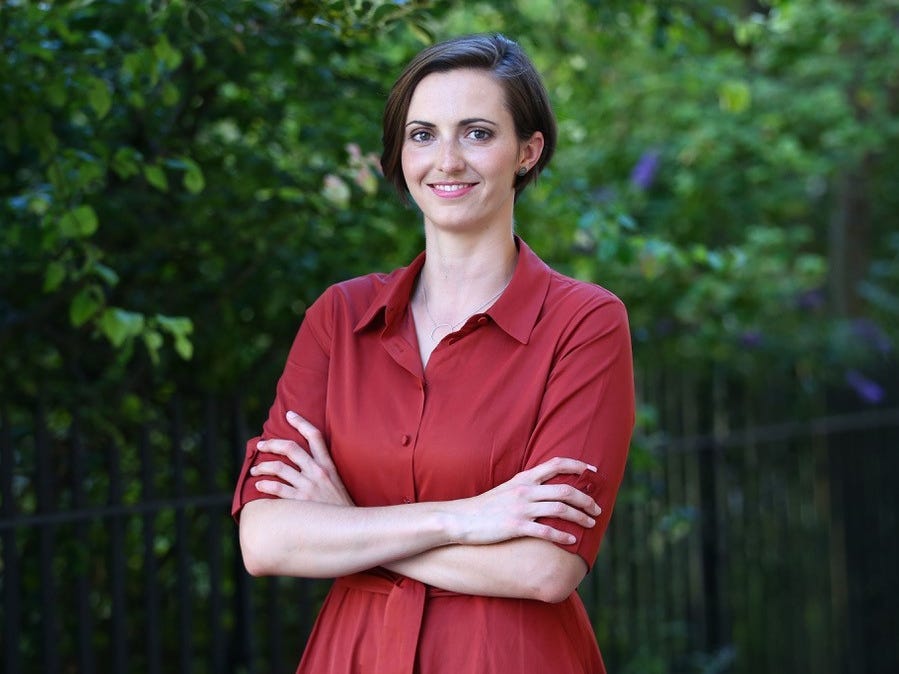
Photo credit: Holly Adams
- eToro's most-copied female trader, Heloïse Greeff, told Insider what makes her portfolio so attractive.
- Greeff is confident in crypto's long-term value, and thinks Ethereum is a better buy than bitcoin.
- The trading platform added 5 million new users in 2020 as popular investing boomed amid the pandemic.
- See more stories on Insider's business page.
"Just get started" is Heloïse Greeff's advice to first-time investors. A data scientist by trade, Greeff is also one of eToro's most successful popular investors.
Since she joined the social trading platform in 2016, Greeff has amassed more than 20,000 "copiers." This means users can invest their capital to proportionally mimic her stock portfolio. Greeff was the third-most copied at the time of publication.
This also makes her the highest-ranking woman investor on the platform.
And more people are investing; eToro told Insider that it added five million new users globally to its platform in 2020, and another 1.2 million in January this year.
Insider asked Greeff how she invests and why she thinks her portfolio is so popular. Here are the five main takeaways:
1. Greeff buys stocks based on the underlying technology, such as Blockchain, rather than for specific products.
Greeff's portfolio comprises mostly high-performing tech stocks that have benefited from life moving more online during the pandemic.
But, rather than investing in companies for their end-user products, Greeff selects stocks based on the underlying technology and its potential for widespread adoption across industries in the future.
"I'm not that heavily invested in driverless cars or any of those buzzy trends at the moment," Greeff said. "What I'm thinking more about is what the marketplace is going to look like for that driver who now has more free time."
Greeff invests in companies that she thinks will be the best at capturing people's attention. Blockchain, in particular, piques her interest. This is why she invests in cryptocurrencies.
"Cryptocurrency is a really simple way of introducing blockchain into society," Greef said, citing the rise in the use of smart contracts in real estate and finance.
2. Greeff won't sell her cryptocurrency stock anytime soon, and thinks Ethereum has more long-term value than bitcoin.
Greeff bought her first bitcoin in 2013 and plans to hold onto it for a while, despite recent market volatility.
"I'm not a speculator on cryptos," she said. "I tend to keep them for slightly longer and just ride through the volatility."
The crypto market lost 47% of its value over the seven-day period to Wednesday, according to data from CoinMarketCap.com. This occurred, in part, due to a mass sell-off sparked by an announcement from China's state bank that digital tokens couldn't be used as a form of payment.
Asked whether bitcoin's plunge this week caused her concern, Greeff said that the cryptocurrency is "a bit like a teenager right now. It's not as established yet in what it should be doing for the market."
However, Greeff prefers Ethereum.
"The underlying blockchain architecture which Ethereum runs on has a lot of potential to go way beyond a cryptocurrency," she said.
3. She avoids "meme stocks," and believes discipline and "small wins" are behind her portfolio's success.
Greeff emphasized the value of taking a long-term, incremental approach to investing.
"I don't tend to take very high-risk positions," she said. "I tend to have moderate returns and just keep compounding that over time."
Greeff's maximum drawdown - a measure of the stock's decline from its highest to its lowest value over time - is just 16% over the entire lifetime of her portfolio.
Greeff thinks that being honest and transparent with her copiers is behind her success on the platform. "I think it's really just consistent performance, and I don't over-promise anything," she said.
"I've told people off from copying me when they are expecting massive returns," she added - although Greeff's portfolio delivers an almost 30% average annual return, according to her website.
4. Greeff thinks the pandemic has made it easier for women to start investing.
Only 15% of bitcoin traders are women, according to eToro's data, but the company added new female users to its platform at a faster rate than men in December. The trading app reported a 366% rise in the number of women signing up compared to a 248% rise for men.
Greeff is not surprised.
"Technology has really enabled more women to invest, even though it is a male-dominated industry historically, because we're now all sat behind a screen, it has kind of broken down those barriers," she said.
Greeff said women have a reputation for being risk-averse when they invest, but there are advantages to this.
"For me, being a woman does not influence my tolerance to risk, but it rather influences my decision-making process," she said. "I tend to take a bit more time to gather more information, to make sure that I collect all the data before I make a decision."
"I tend to do my homework more," she added.
5. She uses machine learning to help pick stocks, but also reads philosophy and monitors eToro's social feed to predict cultural trends.
Social trading is Greeff's side gig; she works as a clinical researcher at the University of Oxford, where she specializes in machine learning. These are skills she brings to her investing.
Greeff said her "bread and butter" is using machine-learning techniques to crunch complex data on companies, but this is not the main part of her investment strategy.
Instead, she picks stocks based on company reports, eToro's social feed, and even by reading philosophy books to help predict cultural shifts. Greeff then applies machine learning to analyse good entry and exit points for those stocks.
"There's no black box which makes the decision," she said.
"I use the eToro social feed as a data point to get into the hive mind of what the long-term cultural trends are of the end users who will be likely using technologies."